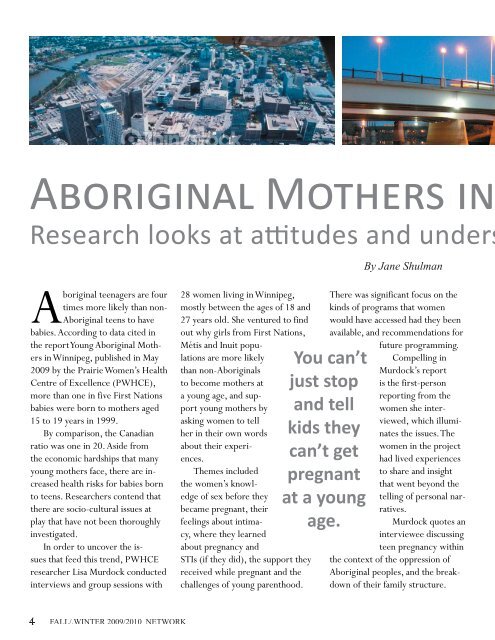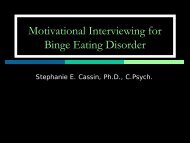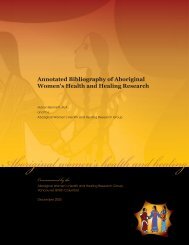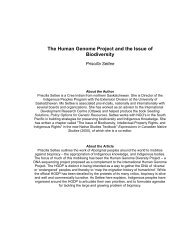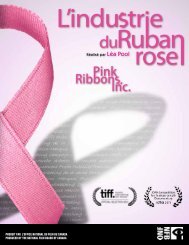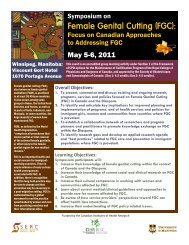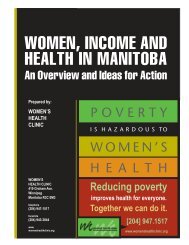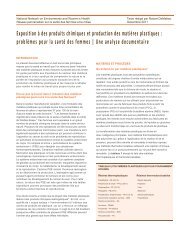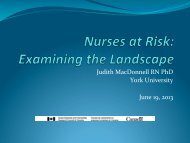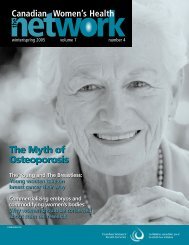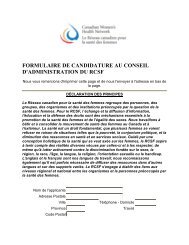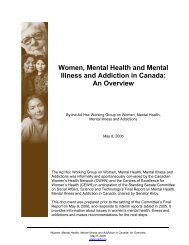Network 12-1.pdf - Canadian Women's Health Network
Network 12-1.pdf - Canadian Women's Health Network
Network 12-1.pdf - Canadian Women's Health Network
You also want an ePaper? Increase the reach of your titles
YUMPU automatically turns print PDFs into web optimized ePapers that Google loves.
A M <br />
Research looks at atudes and unders<br />
By Jane Shulman<br />
Aboriginal teenagers are four<br />
times more likely than non-<br />
Aboriginal teens to have<br />
babies. According to data cited in<br />
the report Young Aboriginal Mothers<br />
in Winnipeg, published in May<br />
2009 by the Prairie Women’s <strong>Health</strong><br />
Centre of Excellence (PWHCE),<br />
more than one in five First Nations<br />
babies were born to mothers aged<br />
15 to 19 years in 1999.<br />
By comparison, the <strong>Canadian</strong><br />
ratio was one in 20. Aside from<br />
the economic hardships that many<br />
young mothers face, there are increased<br />
health risks for babies born<br />
to teens. Researchers contend that<br />
there are socio-cultural issues at<br />
play that have not been thoroughly<br />
investigated.<br />
In order to uncover the issues<br />
that feed this trend, PWHCE<br />
researcher Lisa Murdock conducted<br />
interviews and group sessions with<br />
28 women living in Winnipeg,<br />
mostly between the ages of 18 and<br />
27 years old. She ventured to find<br />
out why girls from First Nations,<br />
Métis and Inuit populations<br />
are more likely<br />
than non-Aboriginals<br />
to become mothers at<br />
a young age, and support<br />
young mothers by<br />
asking women to tell<br />
her in their own words<br />
about their experiences.<br />
Themes included<br />
the women’s knowledge<br />
of sex before they<br />
became pregnant, their<br />
feelings about intimacy,<br />
where they learned<br />
about pregnancy and<br />
STIs (if they did), the support they<br />
received while pregnant and the<br />
challenges of young parenthood.<br />
You can’t<br />
just stop<br />
and tell<br />
kids they<br />
can’t get<br />
pregnant<br />
at a young<br />
age.<br />
There was significant focus on the<br />
kinds of programs that women<br />
would have accessed had they been<br />
available, and recommendations for<br />
future programming.<br />
Compelling in<br />
Murdock’s report<br />
is the first-person<br />
reporting from the<br />
women she interviewed,<br />
which illuminates<br />
the issues. The<br />
women in the project<br />
had lived experiences<br />
to share and insight<br />
that went beyond the<br />
telling of personal narratives.<br />
Murdock quotes an<br />
interviewee discussing<br />
teen pregnancy within<br />
the context of the oppression of<br />
Aboriginal peoples, and the breakdown<br />
of their family structure.<br />
4 FALL/.WINTER 2009/2010 NETWORK


